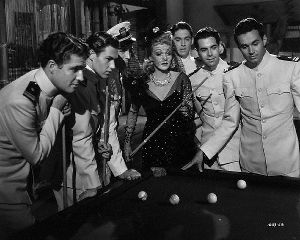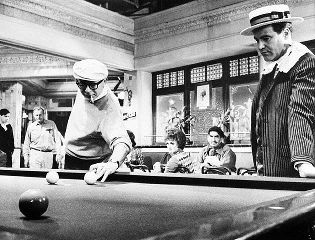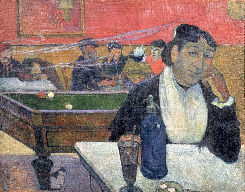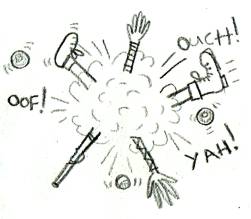| Please note: The Billiards Congress of America (BCA) does not endorse smoking, drinking, or brawling during the game of pocket billiards. |

Pool, like most things in life, is ninety percent mental. We were going to say all things in life, but then we started thinking of exceptions, like going to the bathroom, which is at least ninety percent physical. For most people. But anyway, the point is that there is an important mental aspect to all sports and arts, and pool is no exception. Therefore this pamphlet describes the essential inner aspects of the game, such as the value of contempt, and important aesthetic considerations, such as smoking, drinking, and brawling, which are crucial to the enjoyment of the game in the absence of actual skills.
There can be no question that perceptions and attitudes have a tremendous influence upon the conduct of play. Some people look at the pool table and see a pool table, with balls arranged upon it in some pattern; they hold the cue and feel a straight stick, which can be controlled and aimed. Other people look at the table and see a reeling expanse, pebbles, fissures, gleaming fish shimmying past, rain and gargoyles. The cue feels like an eel, and an ill-behaved one at that. For these people it takes considerable effort just to keep from giggling and falling over.
The problem with being a novice pool player is that an inordinate amount of time is spent missing shots. This unfortunate situation can easily lead to damage to one's self-image, as well as to one's nervous and digestive systems, creating tensions that inevitably lead to a life of crime and sexual dysfunction. Fortunately, you do not need to wait until you have mastered the technical elements of stance, bridge, and stroke before unleashing your inner pool shark and dominating the psychological aspects of the game.
At some point in your pool-playing career, you will hope to internalize your intellectual understanding of the game, letting your hours of practice seep into your subconscious, and into the muscles and nerves of the body itself. When this transition has successfully occurred, no more conscious effort goes into the position and movement of the body. At this point of unconscious knowledge, pool becomes self-expression; pool becomes art. Before one can approach this level, however, one needs to understand the value of contempt.

The intimate connection between the beauty of art and the feeling of contempt may not be readily apparent to all readers. It starts with an understanding of confidence. Confidence and contempt are necessarily linked, particularly so in a competitive situation. First of all, many beginners are shy when they first approach the table. They feel like they cannot play the game. They are conscious of people watching, and judging them. They feel like they are not good enough to play.
What is needed in such situations is contempt. Contempt empowers. Insecurity cannot just be ignored or set aside, leaving only a void; it has to be pushed aside, replaced by something else. Contempt is a skill that must be developed, like any other. It does not come naturally to everyone. "Why must I have contempt?" you may ask. "Why can't I just be nice and enjoy myself?" And we would answer, well, aren't you lovely, and we'd have some enjoyable friendly games with you. However, someone is going to have to lose and provide most of the quarters, and somebody is inevitably going to need some sort of coping mechanism. Contempt will be with you during these trying times.
Contempt, it has been said, begins at home. Yes, we need to have a certain amount of contempt for the game itself or we'll never have the confidence and skill we need. It is no good to approach the table feeling unworthy, thinking thoughts like "I'll never get this" or "watch me screw this up." It is all right to say these kinds of things, because it indicates an admirable humility and may serve to soften up your opponent, but never think this way. Here is what you should think as you approach the table, no matter how difficult the shot that faces you: "Hmph." This word, or sound, should be thought with some force. It should make your eyes narrow, and perhaps draw your lips down into the hint of a sneer; your breath should leave your nose sharply; your jaw should be set.
You first must believe: "I can do this. I belong here just as much as any of you bastards and there's no reason I can't sink this shot because there's nothing wrong with me, and I'm prepared to take the eyes of anyone who thinks otherwise." This simple assertion enables the development of actual skills and puts you on the road to true confidence. At the very least, it will give you a certain manic expression that is sure to keep your opponent vaguely frightened of you.
Speaking of opponents, it is advisable to keep a healthy amount of contempt reserved for the bastards who are likely to turn up to play against you. First of all, a sense of territory is important; even if you are the one laying down the quarters and making the challenge, the opponent should be regarded immediately as an imposter. Scrutinizing your opponent's character in a narrow and judgmental fashion is a critical part of the mental game, and will prevent any harmful influences on the ambiance you have so carefully cultivated (see Ambiance, below).
Given the amount of time devoted to observation during the average game of pool, an exaggerated and harsh judgement of your opponent is difficult to avoid. Superficially you are watching how a man plays his billiards, but when you watch your opponent shoot you are also quietly estimating his manhood, his bathroom habits, and his upbringing. He is bound to disappoint you in one of these departments, whether by wearing his baseball cap back-to-front or by sipping his pint in a niggardly fashion, to say nothing of the bull-headed or simpering nonsense he might upset you with if he opens his mouth.
Having observed your opponents and dragged their characters over the hot coals, it is wise to maintain your contempt by awarding them unpleasant nicknames such as "Stoat Girl" or "The Man With No Bottom." However, care must be taken not to overdo things. Contempt for the opponent is not a bludgeoning or seething emotion. Dislike must be tempered by an almost affable enjoyment of social intercourse; the opponent must feel that that in some way your character is larger than his, more generous, and yet more exacting. Of course, you may even be genuinely charmed by someone you meet over a casual game of pool, and that's not to be frowned upon; after all, there are enough cold unfriendly buggers in the world without you adding to their numbers. Just remember that whomever you're playing billiards with, there's always someone else there looking out for you: Your special friend, contempt.

This brings us to the Thing, which gets its own special category of contempt. Nothing in pool is more annoying than an opponent who uses the Thing. Every pool table has one, there is nothing to discourage it in the official rules, and it saves those who are short in stature from unseemly sprawling, but its use is, in our opinion, unquestionably vulgar and Teutonic. Better to sprawl and foul than to destroy the fluid connection between body and cue with this ugly prosthetic. That is all.
Thus we have seen that exuding contempt is one of the keys to mastering the game of pocket billiards. It also helps if you thoroughly understand the rules of the game, which is where we now turn our attention.
This subject is covered quite thoroughly in this piece's companion volume, Your Inner Pool Shark, Part Two: The Perfect Rules. For now, a brief summary will suffice.
The fact of the matter is there are all kinds of various and conflicting rules by which people play the game. This state of the affairs represents both a source of frustration and an opportunity for exploitation. Knowing which rules to accept and which to reject, and under which circumstances, is key to your mastering of the mental game of pool. The way in which you wield the rules determines much about the progress of the game and the psychological state of your opponent.
Many of the official world-standardized rules for eight-ball are largely unknown in your average bar, so your sudden announcement of them can easily startle and dismay your opponent. Even seasoned veterans of the bar pool scene can be made to lose their concentration on the game and indeed their grip on reality by a timely invocation of a little-known official rule. Good examples include: The table is always open after the break regardless of what went down; you don't have to call each kiss and carom (just the ball and the hole); and when you accidentally sink the cue ball on your eight-ball shot, you don't lose (if the eight-ball didn't go in)--play simply continues!
Some less common practices, such as taking balls out and putting them back on the table if they were sunk illegally, can very effectively be ridiculed outright if one has a copy of the official rules tucked into one's back pocket. Even the most common racking arrangement, whereby the person carefully ensures that the balls forming the perimeter of the triangle alternate stripes and solids all the way around, is wrong and can be ridiculed.
However, there is more to mastery of the rules than simple ridiculing and contesting. You must always take into account the relative talents of yourself and your opponent, your relative states of mind, your relative levels of intoxication, who is affected by the particular ruling, who is winning, and whether anyone is watching. Only then can you determine whether to ignore a rule, accept it, or contradict it. Here there is no substitute for studying, and we strongly encourage the reader to obtain a copy of this pamphlet's companion volume (referenced above), as well as the official Billiards Congress of America rules.

Ambiance is what distinguishes one pool hall from another. You'll need to pay attention to certain aesthetic considerations in choosing an environment that is conducive to mastery of the mental game of pocket billiards. There are dank bars with idiosyncratic coin-operated tables and there are bourgeois temples of billiard luxury. There are irritating pool halls and pool halls that feel like being under the sea. There is in short a whole universe of pool halls, and anyone who says a pool hall is a pool hall is obviously a brute and you shouldn't pay him any notice.
The color of the baize is important since if it is green it glows beautifully and calmingly and if it is red it doesn't. Why people buy red pool tables is a mystery to us -- perhaps there's a good reason but we can't for the life of us think of one. Someone has some explaining to do. Of course there's no point in having lovely green baize if you don't also have the right lighting. Most pool halls are too brightly lit everywhere but over the table. Not only does this create distractions but it stops the baize from glowing, which is a terrible waste.
Music is of course crucial, although it helps to have quite an eclectic taste. It's good to be in a place where the music doesn't annoy you and where you can keep your quarters for the pool table rather than the jukebox. Quarters, in fact, are one of the major contributors to ambiance; there is a whole etiquette that goes along with a coin-operated pool table, besides the extremely satisfying rumbling noises they make when you put your money in. Obtaining quarters can be a chore, and most people we play against spend half their time running back and forth, buying them four at a time. This is plain silly -- if you're going to get all serious about pool then you're going to have to get serious about quarters. Take pride in buying as many as possible at one time -- the ideal amount for a medium night of pool is a ten dollar roll. We have even taken to keeping our quarters in a special purse, which adds to our sense of security. That way, instead of a boring old roll of quarters, we have a magic bag full of sacred pleasure tokens.
Of course, there is a special feeling about buying a pool table
by the hour. It is a grand and comfortable feeling. Unlike coin-operated
table environments, where the only thing between you and a potentially
unpleasant opponent is a dirty handful of mangy old quarters, tables
by the hour place you in a protected cocoon of pool-playing serenity.
Furthermore, you are not constantly reminded of
Food is important -- pool is essentially a hungry game and you should wait until you've played at least five games before you start thinking about food. When you do order, it has to be the sort of food you can eat on the wing, something that doesn't require cutlery, yet it must be greasy and sustaining. What we are really saying is that the only acceptable foods are nachos and jalapeno poppers.

[Please note again: None of these are endorsed by the Billiards Congress of America during the game of pocket billiards .]
Playing pool without a good supply of beer and cigarettes is downright impossible. If, like us, you are a nonsmoker, please consider taking up the habit; we did, and our lives improved immeasurably. Similarly, if your lifestyle does not allow for the consumption of alcoholic beverages, what you'll want to do is toss that little rule right out the window right now. Simply adopt a new, slightly different lifestyle, and open yourself a nice cold frosty one.
When pressed, we will admit that not everyone needs booze and ciggies to play well. Take a man like Willie Mosconi, impeccably dressed, temperate--it's hard to imagine this man slobbering and incoherent. Our guess is that, apart from the occasional sip of bourbon and a drag on his cigarillo, Willie liked to play with a clear head. However, Willie was part of "The 5 Percent," those who possess a special gift that allows them to break the rules (this also accounts for any photographs of him using "The Thing," incidentally). For the other 95 percent of us, beer and cigarettes are as important as the Fundamentals and should be pursued with the same zealous dedication.
Consider the pace of the game, with its leisurely taking of turns and thoughtful interludes. Looked at from a certain angle, pool is a mere accompaniment to smoking and drinking. Even for those of us who view the pool-playing as the priority, these other elements must be given the highest consideration.
For pool, you need a drink that suits the pace of the game. Beer is the obvious choice since it is weak and voluminous. It takes a whole night's work to get soused on beer so you can play a really satisfying amount of pool before blind drunkenness sets in. The other good thing about beer is that many places sell it in large pitchers, which cuts the hassle of going to the bar, leaving you to get down to the business of playing pool and getting drunk as a lord.
Beer then, is perfect, but it's still worth considering the other options. Shorts like whisky are highly unsuitable simply because they are too short and however good you are at sipping you'll be wasted in no time. Similarly, most mixed drinks taste too nice and fizzy to last any reasonable length of time. Apart from Irish coffee, which adds a rare sharpness to one's performance, they are generally no good at all. There are a couple of girly drinks that will do, however, and do splendidly at that. Frozen margaritas are big and salty enough to outlast a pint and their grandness leads to a rather sophisticated sort of drunkenness. For early morning pool, Bloody Marys and Mimosas are particularly fitting and will generally do instead of breakfast. Indeed there are probably many suitable drinks and you should feel free to experiment and choose your own poison. We can only advise that if you are going to drink something other than beer, the larger and fancier the better.

The official rules say nothing about how drunk a player should be but a good guideline would be about four pints and three or four cigarettes down the line. Of course, a player cannot stay at this optimum level throughout the match. A good player will pace his boozing and smoking such that he reaches this peak at a strategic point in the game. Giving any kind of guideline is pretty useless since the effects of intoxicating substances on pool playing ability vary so wildly between players. There are people whose game deteriorates alarmingly after a pint of lager, while others continue getting better and better until, at the 20-pint mark, they finally fall over quite suddenly. Practicing your drinking and smoking to find your own performance curve cannot be too strongly advised.
It would be reckless of us to conclude without giving some kind of cautionary note on the harmful side-effects of iniquity. We have no intention of hoodwinking our audience on this score. While the ethics of our profession do not allow us to advocate pool without beer and cigs, we do feel it's best to work out some kind of system that allows you to continue drinking and smoking without ruining your health too much. A university or Vietnamese pool hall, with strict rules on abstinence can come in handy for milder days of the week.
You don't have to be too rigorous about it; remember that the intention is to avoid wrecking your health, not to spoil all the fun. In our research we've found that while teetotal pool halls encourage abstinence they certainly do not ensure it. It's all too easy to sneak in a nip of vodka in an innocent can of soda, and one of the raisons d'etre of the hip flask is to allow concealed drinking in university pool halls.
So, there's no avoiding it, pool, beer, and cigarettes are inseparable and should be treated as such. Pool, like basketball, is a sport that places great physical demands on the body. If the booze and smoke are starting to hurt then it's probably time to give up the game altogether.

This brings us to the subject of brawling, which is woven seamlessly into the fabric of pool, beer, cigarettes, and contempt. Given how partial most of us are to a good brawl and how suited the game is to it, it's amazing that pool halls aren't torn apart nightly by fighting. A brawl has four essential elements: good props, a disagreement, a lot of mess afterwards, and the condition that nobody should get really properly hurt. For props, there are in pool: Long sticks for swiping, balls for ducking, stools for smashing and toppling, not to mention a large table for running around and standing on at the peak of the action.
As for the mess, well that's covered by the props, especially if you add a few broken glasses and beer. And as for nobody getting seriously hurt, well that depends, and that's probably where you have to exercise a bit of restraint. As in cartoons and traditional westerns, the ideal brawl should end with everyone getting up, rubbing their heads, and walking away with a slow, comical gait.
We hope we have in these pages sketched out the most important fundamentals of the mental game of pocket billiards. Bear in mind always that it is not merely the sinking of balls that determines the aesthetic experience of playing the game; rather, it is the collection of intangibles and attitudes, in their sum, that create your overall enjoyment and release your inner pool shark. So don't worry much about the mundane matter of missing shots. Always remember the words of Gus Baroutas, one of the finest gentlemen ever to play the game, who said: "If people didn't miss, there wouldn't be pool."